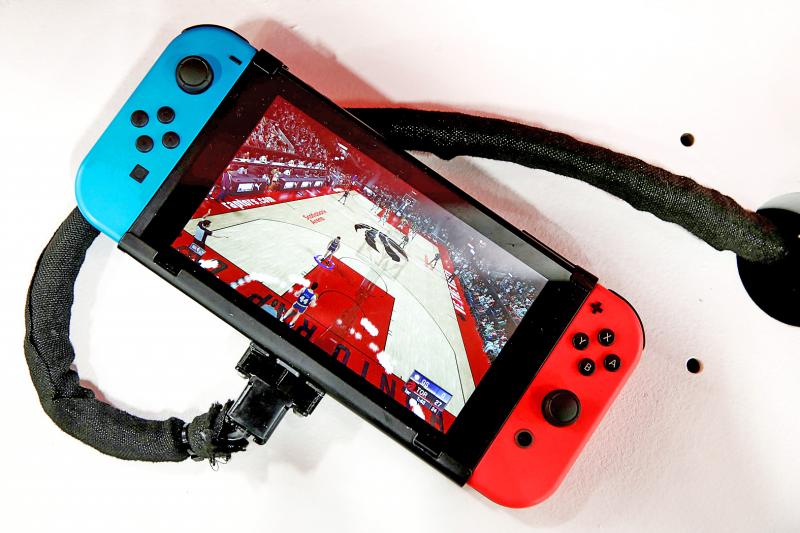Toshiba Corp said it would not be able to meet demand for power-regulating chips for another year and, in certain cases, through the end of next year, offering a fresh warning for makers of vehicles, consumer electronics and industrial machines struggling with component shortages.
“The supply of chips will remain very tight until at least September next year,” said Takeshi Kamebuchi, a director in charge of semiconductors at one of the company’s units. “In some cases, we may find some customers not being fully served until 2023.”
Material shortages and demand outpacing output capacity are to blame for Toshiba’s inability to fulfill orders for a component that does not require advanced production technology and has typically been deemed a commodity, Kamebuchi said.

Photo: Reuters
Mature tech such as Toshiba’s power chips is cheaper than cutting-edge memory and sensors, but no less important for any electronic device. If the processor is the device’s brain, power-regulating silicon and circuitry serve as the heart and vascular system, helping to smoothly transmit electricity.
Toshiba plans to invest ¥60 billion (US$545 million) in the three years to March 2024 to boost output of power semiconductors, Kamebuchi said.
Options beyond that period include additional investment that may include building another factory. Despite some investor concern that demand will evaporate after the pandemic-fueled frenzy for electronics, Kamebuchi said the company is confident that orders will keep growing rapidly enough to sell out all its production lines for years to come.
Automakers including Toyota Motor Corp and Volkswagen AG have had to halt or reduce production due to widespread chip shortages.
Kamebuchi said that some chip manufacturers are prioritizing automakers in their production and Toshiba is similarly making every effort to minimize the impact on auto assembly lines.
“We usually receive orders weeks and months in advance, but we currently face increasing inquiries for half a year into the future and beyond,” he said. “Long-term contracts piling up like this is new to us.”
Video-game consoles are another prominent victim of the power chip shortage. Sony Group Corp said it was still confident it can sell more than 14.8 million units of the PlayStation 5 this fiscal year to match the pace of its predecessor, but the new console’s production in the April-June quarter lagged behind the PlayStation 4’s for the same period.
Nintendo Co’s Switch production has not been sufficient to serve customer demand, Nintendo president Shuntaro Furukawa said.
The company intends to sell 25.5 million Switch units this fiscal year.
Game console production is vulnerable to a lack of components. Manufacturers are making daily calls to suppliers to ensure parts would reach assembly lines as promised, a top executive at an assembly contractor said.
Some console customers have told the assembler that they might alter their circuit board design to reduce the required components, the person said.
Toshiba is holding daily discussions on how best to allocate its limited output, with the company having to apologize to some customers for being unable to deliver in a timely fashion, Kamebuchi said.
“We consider which customer faces the most severe situation, such as the risk of the whole production line halting or the business getting obliterated without the supply of chips,” he said. “Game console makers are among the customers making the strongest demands and I’m sincerely sorry for their frustration as none of them have a 100 percent satisfaction.”

South Korea’s equity benchmark yesterday crossed a new milestone just a month after surpassing the once-unthinkable 5,000 mark as surging global memory demand powers the country’s biggest chipmakers. The KOSPI advanced as much as 2.6 percent to a record 6,123, with Samsung Electronics Co and SK Hynix Inc each gaining more than 2 percent. With the benchmark now up 45 percent this year, South Korea’s stock market capitalization has also moved past France’s, following last month’s overtaking of Germany’s. Long overlooked by foreign funds, despite being undervalued, South Korean stocks have now emerged as clear winners in the global market. The so-called “artificial intelligence

‘SEISMIC SHIFT’: The researcher forecast there would be about 1.1 billion mobile shipments this year, down from 1.26 billion the prior year and erasing years of gains The global smartphone market is expected to contract 12.9 percent this year due to the unprecedented memorychip shortage, marking “a crisis like no other,” researcher International Data Corp (IDC) said. The new forecast, a dramatic revision down from earlier estimates, gives the latest accounting of the ongoing memory crunch that is affecting every corner of the electronics industry. The demand for advanced memory to power artificial intelligence (AI) tasks has drained global supply until well into next year and jeopardizes the business model of many smartphone makers. IDC forecast about 1.1 billion mobile shipments this year, down from 1.26 billion the prior

NEW IDENTITY: Known for its software, India has expanded into hardware, with its semiconductor industry growing from US$38bn in 2023 to US$45bn to US$50bn India on Saturday inaugurated its first semiconductor assembly and test facility, a milestone in the government’s push to reduce dependence on foreign chipmakers and stake a claim in a sector dominated by China. Indian Prime Minister Narendra Modi opened US firm Micron Technology Inc’s semiconductor assembly, test and packaging unit in his home state of Gujarat, hailing the “dawn of a new era” for India’s technology ambitions. “When young Indians look back in the future, they will see this decade as the turning point in our tech future,” Modi told the event, which was broadcast on his YouTube channel. The plant would convert

People stand in a Pokemon store in Tokyo on Thursday. One of the world highest-grossing franchises is celebrated its 30th anniversary yesterday.